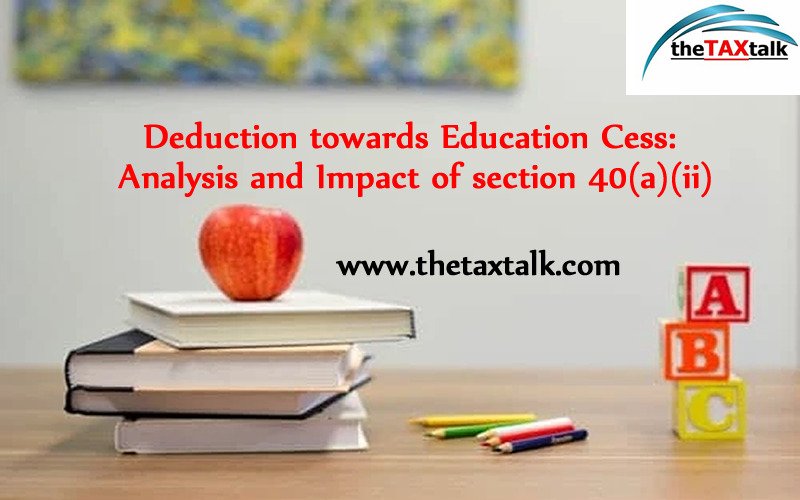![]()
Deduction towards Education Cess: Analysis and Impact of section 40(a)(ii)
ITAT Delhi in the case of Qualcomm India Pvt. Ltd. Vs Addl. CIT has held that education cess paid on Income Tax doesn’t come under the purview of the definition as it is levied on the amount of Income Tax but not on profits of business. It has further held that education Cess is neither in the nature of capital expenditure nor personal expense of the assessee. Expense of Education Cess is mandatory expenses to be paid but does not fall under capital expense and personal expenditure and hence may be allowed as deduction.
The copy of the order is as under:
ITAT Delhi
Qualcomm India Pvt. Ltd. Vs Addl. CIT
ITA No. 6421/Del/2019
Order Dated 01/11/2021
The present appeal has been filed by the assessee against the order dated 29.05.2019 passed by the AO u/s 143(3) r.w.s. 144C of the Income Tax Act, 1961.
2. Following grounds have been raised by the assessee:
i. Rejection of economic analysis:
The DRP erred in upholding the TPO’s action of not accepting the economic analysis undertaken by the assessee in accordance with the provisions of the Act read with the Income Tax Rules, 1962 (“IT Rules/Rules”), and modifying the economic analysis for the determination of the arm’s length price and undertaking a fresh analysis.
ii. Selection of functionally different companies as comparable to Business support services:
The DRP erred in upholding the TPO’s action of not undertaking an objective and comparative analysis and inter alia selecting the following company as comparable to software development services rendered by the Appellant which is functionally different:
a Killick Agencies & Mktg. Ltd.
iii. Rejection of companies selected as comparable to the Business support services:
The DRP erred in upholding the TPO’s action ofnot undertaking an objective comparative analysis and inter alia rejecting the following companies as comparable to the software development services rendered by the Appellant:
a) India Tourism Development Corporation Ltd.
b) MCI Management (India) Ltd.
c) Concept Public Relations India Ltd.
iv Interest on outstanding receivables:
The DRP erred in upholding the TPO’s action of making transfer pricing adjustment and imputing the interest on outstanding receivables as on 31st March 2015 relating to provision of services to the AEs:
a) Not appreciating the fact that the receivables are consequential/closely linked to provision o services to the AEs;
b) Not appreciating the facts and circumstances surrounding the receivables and re-characterizing the outstanding receivables as loans advanced to the AEs.
v. Incorrect computation of margins:
The AO erred in not giving effect to the directions of DRP who directed to verify and take correct margins of the compara bles and adop0ted an inconsistent approach while computing operating margin of the comparable companies used in the determination of the ALP resulting in incorrect margins o the comparable companies.
vi Risk adjustment:
The TPO and DRP erred in not adjusting the net margins of the comparable companies taking into account the functional and risk differences between the international transaction of the assessee, being only a captive service provider and a risk free entity and the comparable transactions in accordance with the provisions of rule 10B(1)(e) of the Income Tax Rules, 1962 (‘the Rules’).
vii. Depreciation adjustment:
The DRP erred in not adjudicating on the adjustment to be made for the differences in depreciation policy followed by the Appellant and the comparable companies.”
3. The Qualcomm India Pvt. Ltd. (QIPL) is a Private Limited company incorporated in India and is engaged in the business of rendering software development services, IT support services and business support services. QIPL has a 100% Export Oriented Unit (EOU) for the development of the software at Development Centers in Hyderabad, Bangalore and Chennai which are registered under the Software Technology Parks of India (STPI) scheme. The Development Centers are engaged in rendering software development services and IT support services to its Associated Enterprises (AEs). Further, QIPL also provides business support Services (BSS) to its AEs through its Mumbai unit.
4. For the A.Y. 2015-16, QIPL filed its return of income on 27.11.2015 with an income of Rs.507,69,49,710/-. The Assessing Officer vide his draft assessment order, proposed to determine the total income of the assessee at Rs.737,26,39,771/-. While passing the draft assessment order, the AO has considered adjustment of Rs.229,56,90,061/- in accordance with the Transfer Pricing Order dated 30.10.2018 passed u/s 92CA(3) of the Income Tax Act, 1961 by the DCIT, Transfer Pricing Officer-3(2)91), New Delhi. The TPO has rejected the transfer pricing documentation undertaken by QIPL u/s 92C(3)(c) of the Act for determination of the Arm’s Length Price (ALP) of the said international transactions and based on the fresh analysis concluded that the price received by QIPL for provision of Software, IT support and BSS is not at Arm’s length. Further, the TPO has also proposed adjustment on account of interest on the outstanding receivables of Rs. 16,20,061/-.
5. The summary of the arm’s length range determined by the TPO and the adjustment made to the ALP of the international transactions of the company in the TP order is summarized in the table below:
Particulars |
Software |
IT Support |
BSS |
Average unadjusted margin of comparable companies as determined by the TPO |
24.53% |
21.16% |
28.81% |
Transfer price of the international transactions of the assessee |
25,982.11 |
930.25 |
532.72 |
ALP for the international transactions as determined by the TPO |
28,135.22 |
980.09 |
623.84 |
Adjustment made by the TPO |
2153.11 |
49.84 |
91.12 |

